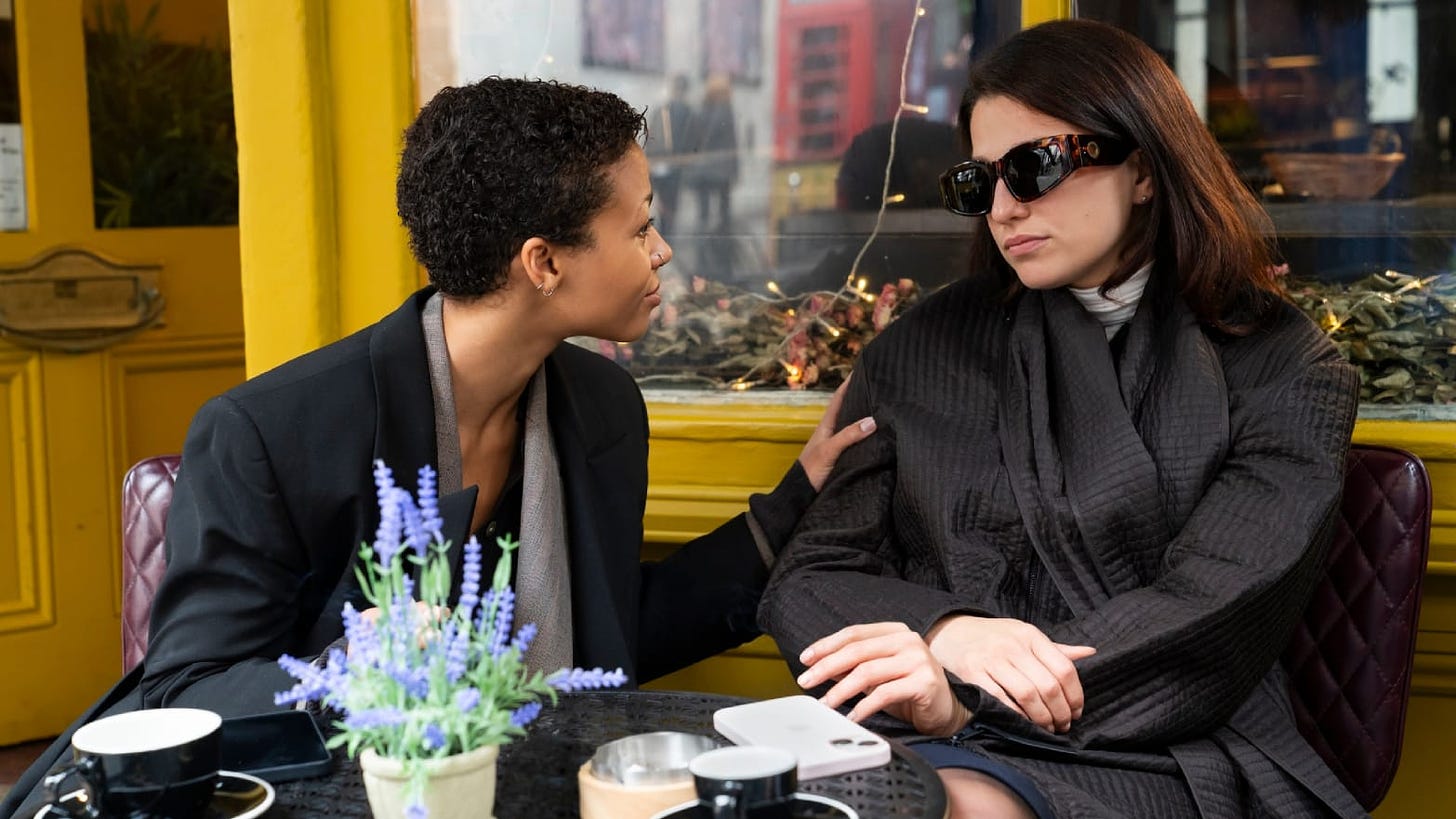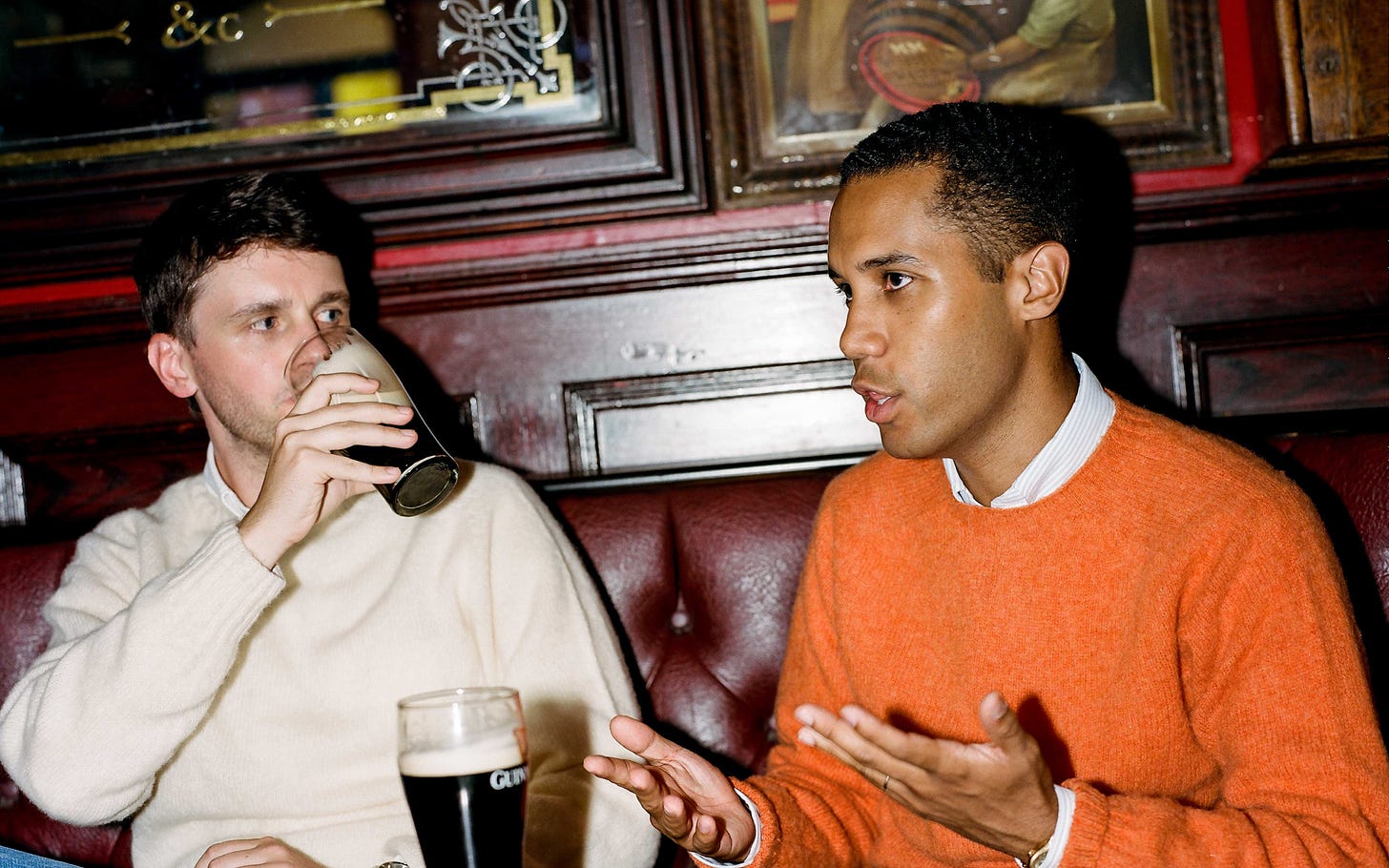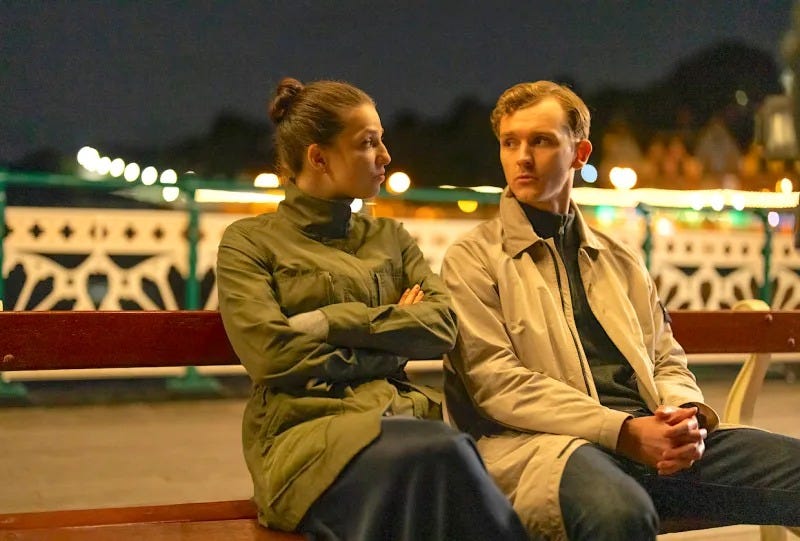An Interview with HBO Industry Creators, Konrad Kay and Mickey Down
a LOOSEY exclusive. spoilers, duh!

If ‘New York’ is the fifth character in Sex and the City, ‘money’ is the omnipresent star in HBO’s Industry. Tonight, the season finale of Industry delivered on its thesis: money rules the world. As narratives orbited across Harper, Yasmin, Rob, and Eric, offering greater depth and stakes than in previous seasons, cash and the pursuit of it remained the show’s central driver.
Impressively, the third season has widened its aperture. No longer just ‘the show about finance,’ Industry, in its third season, has utilized the vehicle of Pierpoint, the fictional investment firm in which the series takes place, to illustrate how all things – the government, publishing, class, privacy, media, security, addiction, love, and friendship – are all engined by money.
It’s a world that was prophesized by the economist Adam Smith and later perfected by Wu-tang Clan:
Cash Rules Everything Around Me
C.R.E.A.M. Get the money
Dolla dolla bills, yall!
I believe the show’s co-creators, Konrad Kay and Mickey Down, are the theory's latest visionaries, masterfully sculpting the philosophy across eight episodes through a medley of wit and satire. The finale wraps the future of Pierpoint, and those who have worked within it, in a tight bow, making me think about the mechanics of the show and where it will go next. Industry, now renewed for a fourth season with HBO, can continue following the money. It can follow Harper to New York or it can ditch the cast and the world of finance altogether and take on a new industry. Technology? Oil and gas? Luxury goods? Who’s to say?
Industry and the Anxiety Aesthetic
Now, I’ve written about Industry before. Once on this newsletter and another, expanding my thoughts, for The Washington Post. Thanks to HBO, I was able to chat with the show’s creators for an exclusive LOOSEY interview about the craft of the show, its phenomenal season, and what to expect next.

My questions are in bold and Mickey and Konrad, who responded via email, are in italics. Enjoy!
Congratulations on an outstanding finish to the third season! It’s been thrilling to tune in each Sunday. When creating this season, in what ways did you hope to exceed the first two?
A widening of scope and broadening of the canvas — showing how the trading floor was connected to the British political and media landscape and a general heightening of the stakes of the story. The show offers a lot of commentary on things like class and micro-character stuff too, but to us the keyword was: entertainment. We wanted to grab the viewer and not let go for every minute of the eight hours we delivered. Everything else was a bonus.
The closing songs of the third season have functioned as a crescendo for each episode and are very, very fun when you stop to consider them within the episode's context. What has been your process for song selection this season and was there a song that you wanted to include but couldn’t?
We choose the cut-to-black needle drops ourselves, often at the script stage, often with the input and industry expertise of our superb music supervisor Ollie White. The cut to black is essential storytelling to us: it’s the feeling you communicate to the viewer long after the episode ends. It can linger. A huge percentage of that is the point of the cut but obviously the emotion is really a function of the music. We’ve picked stuff like Pet Shops Boys for a sense of euphoria and glamour, driving the story into the next episode. Wu-Tang felt like a balls-out rebuke and a triumph for Rishi. Rage Against The Machine is of course an ironic and loaded choice, but also a scorched earth drop for Eric and Pierpoint. For us the meaning of the choice is subordinate to the feeling it evokes in us when we watch. If it feels right, it works.
One of the questions I had from watching earlier seasons was “Why don’t they just fucking quit?” But this season, we see how younger employees like Venetia and Sweetpea take exit opportunities while legacy members of the firm like Eric, Bill, and Rishi have an abusive attachment to Pierpoint and consider themselves “lifers.” This is quite reflective of how different generations view job loyalty and yet it’s also compounded by the fact that those most willing to stick around to take the abuse of Pierpoint are the ones who arguably have the most power to change it for the better. What commentary, if any, were you looking to illustrate on organizational dynamics across generations?
There is an older generation - Eric, Adler - who remember Pierpoint as a titan in the 1990s. A Salomon Brothers equivalent. They are under the spell of that memory: Pierpoint was glamorous, aspirational, the centre of the universe. They are in thrall to all the years they spent there and deeply institutionalised. Also they are from the old school: eat or be eaten. What was done to me, must be done to others. To someone like Sweetpea, the name Pierpoint doesn’t connote anything other than a stepping stone to the next thing. She has no sense of loyalty to it. Why would she? It’s a shell of the thing it was post-2008. Having different perspectives on money, HR, careerism, cultural mores — this was central to the intergenerational conflict of the show. But equally: it’s too simple to say that your generation defines your outlook. Sweetpea and Venetia are both Gen Z and totally different.
Something I have found fascinating about the show is how you’ve decided to handle race. There is so much diversity in the cast – Harper, Yasmin, Eric, Rishi Rob – and yet, racial identity rarely takes center stage. That said, the characters aren’t ‘colourless.’ I feel as though I understand how their identity has informed their choices and defined their outcomes through small details like Rishi’s discomfort in Somerset with his neighbours, Rob’s ability to miraculously fail upwards, and Harper and Eric’s unique bond. It’s implicit but it's there. How intentional was the decision to portray race this way and did you have any upfront conversations on how you wanted race to function across this diverse cast?
We were very aware that the financial world’s regular POV in art and entertainment tended to skew old, white, and male. So we wanted to approach Industry differently. But equally, we didn’t want race to be the determining factor of our characters, their desires, and their actions. There are myriad small and hopefully nuanced ways in which it impinges on their path through the story: the roadblocks, the microaggressions, the macro aggressions (!) — but at the risk of sounding trite: all of them share (hopefully) a complex and nuanced humanity that transcends their simple external identities in the world. Faulkner said the only thing worth writing about was “the human heart in conflict with itself.” Everyone in the show, regardless of race, falls into that category — pretty much.
In the sixth episode, the fight scene between Harper and Yasmin has some of the most cutting dialogue I’ve seen in years. Thank you for that. It exemplifies how those who know you the best can hurt you the most but also reminds the audience of the faults of both characters. To me, there was a clear person in the wrong but I was wondering – show creator hats off – whose side would you be on?
Judges score cards too close to call on that bout. It felt like they weren’t so much landing jabs, but knock-out blows — and somehow still standing. You can legitimately make the case that both were right. We wrote the scene thinking that each line had merit as a legitimate grievance. People who know you, know your underbelly and they know where to cut. Friends, good friends, tend not to go there for that very reason. Marisa and Myhala absolutely went full out and took the writing to another level. It was visceral on the page, but on screen: it was something else.
As a reader and writer of fiction, I have been craving more storylines on Hanani Publishing and was delighted to get it in the final episodes. If Hanani Publishing were real, which contemporary writers would be its star authors? Said differently, what are the tastes of the acquisition editors at Hanani Publishing?
Good question! We actually had a scene which we cut for time where the publisher Rose was cynically guiding a young black female author towards writing about heartache and something a little more Sally Rooney.
The parallels between Harper and Eric were outstanding this season, especially the scene with Harper locking Sweetpea (and then Rishi) into the interview room and Eric and Harper smoking on the phone together in the finale. I’ve always been interested if it was their love or hate for each other that fueled their relationship and I felt as though I got an answer at the end. In what way do you think their internal philosophies differ?
We get asked a lot about what their thing is. What’s their deal? Why are they drawn to each other? Easy! Because the plot necessitates it! (Joke). Every interpretation: father-daughter, master-apprentice, Don and Peggy, the same person at two ages — all have an element of truth. They are bound by a kind of yearning and sense of disconnection which is sometimes healed by each other’s company. To try and explain it is to reduce it. Internal philosophies? Hmm. They are both producers and understand that their value, survival, and merit in the world they’ve chosen is linked to how fast they manage to rise and what they acquire. As David Milch says: the filth of self, to be loved, must be clad in glory.
The readers of LOOSEY are delighted about the announcement of season 4. Season 3 ends with each of the leads embarking on new chapters and the London HQ of Pierpoint shutting down. It feels like a nice wrap to the three-season run and the chance to start something completely new for the show. You once mentioned that the thesis for season three was “coke and boats,” what transportation method and party drug is on your wishlist for the upcoming season? How much of a departure from the tenets of the first three seasons can fans expect?
Meth and helicopters. You’ll have to wait and see for more.
Thank you so much! This is a real honour.
Thanks for having us.
K+M.
LOOSEY is a bi-weekly newsletter about culture, technology, and the way we live. If this is something you like, consider subscribing and sharing. Let’s be friends on Instagram.








Great interview. We get to understand more about this season from it's creators.
meth and helicopters!